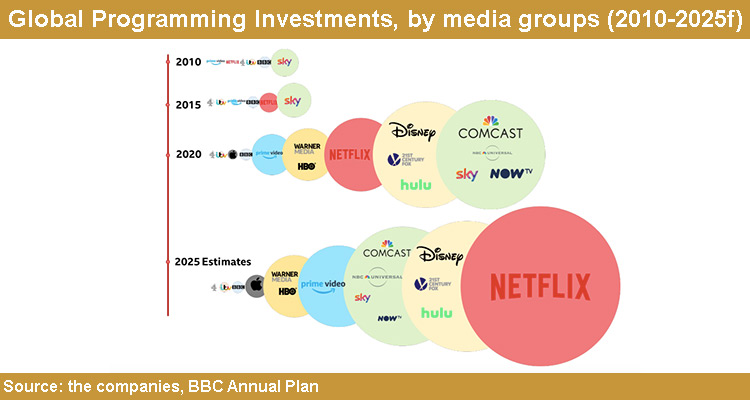On its Annual Plan 2021/2022, the BBC underlined the ‘crucial role’ of the public company during pandemic in terms of information and support to the local creative industry, while announcing the next steps and strategy to continue being relevant in a context of bigger competition from global streamers.

‘BBC has played a crucial role in supporting the UK during this unprecedented period. This has only been possible due to the commitment and continued inventiveness of our staff and those who work with us. Despite the challenges. they have maintained a full range of BBC services and brought new programs, stories and services to audiences’, said Richard Sharp, Chairman, on the initial foreword.
And he added that it is ‘critical’ that the company transforms for the long-term: ‘Audience support is strong. In particular, we must respond to the changes in the media market and the changes brought, and accelerated, by the Covid pandemic, including the increased influence of US-based, global media services and the risk to British culture that brings’.
BBC’s six-year plan means the biggest program of reform since the 1990s and help restore the UK’s creative economy after the pandemic. ‘The plan covers five points: first, getting closer to audiences across the country, through a bold transformation; second, protecting and nurturing our democracy by championing impartial news and reflecting all views, opinions and identities; and third stimulating the creative sector, through spreading TV, radio and online production and building creative and digital partnerships’.

The plan also provides learning and skills to all, through an ‘ambitious’ program of formal and informal learning, career development and apprenticeships; and last but not least,delivers impact across the world, tackling propaganda and misinformation and reflecting the UK’s culture and values.
‘We are making a decisive shift on BBC footprint, turning it into a genuinely UK-wide organisation with a much stronger presence. Doing so will increase the value we bring audiences across the UK and help the creative sector recover from the devastating effects of the pandemic, bringing cumulative extra investment of at least £700m (USD 990 million) by 2027/28 to the UK’s Nations and regions, and driving an additional estimated economic benefit of around £850m (USD 1.2 billion).
Since the start of the crisis, the BBC has supported the UK across its TV, Radio and Online services. Audiences have embraced the offer over the last year, tuning in to its programs and services in ‘huge numbers’. Pan-BBC average weekly reach has remained above 90% over the last 12 months, with monthly reach at 97% on average. 77% of UK adults describe the BBC as important to people in the UK for media, said the report.
BBC has also seen record use of our online services as audiences embraced on-demand services during lockdowns: 33 million UK adults have used BBC Online on average per week. ‘That the BBC was able not only to maintain our business-as-usual services but also to expand our offer at a time of crisis, is testament to the commitment, resilience and ingenuity of our staff and partners, and the importance of strong, resilient institutions’, it highlighted.
For example, the reporthighlights programs filmed from home, including the award-winning comedy Infinity Hill’s Staged filmed over Zoom, or The Ranganation and The Graham Norton Show. The company transformed the Strictly Come Dancing studio and radically changed how it produced the series to continue to bring it UK’s audiences. One of the biggest drama releases of the year,Line of Duty premiered last March.

